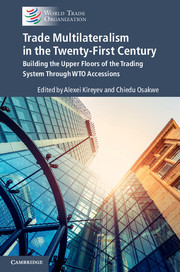 Trade Multilateralism in the Twenty-First Century
Trade Multilateralism in the Twenty-First Century Book contents
- Frontmatter
- Contents
- List of Plates
- List of Figures
- Notes on Contributors
- Foreword
- Acknowledgements
- List of Abbreviations
- Disclaimer
- 1 Making Trade Multilateralism Work for All: The Role of WTO Accessions
- PART I WTO Accessions and the New Trade Multilateralism
- PART II Negotiators’ Perspectives on the WTO Accession Process
- PART III Accessions Acquis: Thematic Perspectives and Implementation Challenges
- Contributor Biographies
- Index
Foreword
Published online by Cambridge University Press: 28 November 2017
- Frontmatter
- Contents
- List of Plates
- List of Figures
- Notes on Contributors
- Foreword
- Acknowledgements
- List of Abbreviations
- Disclaimer
- 1 Making Trade Multilateralism Work for All: The Role of WTO Accessions
- PART I WTO Accessions and the New Trade Multilateralism
- PART II Negotiators’ Perspectives on the WTO Accession Process
- PART III Accessions Acquis: Thematic Perspectives and Implementation Challenges
- Contributor Biographies
- Index
Summary
At the launch of the first volume of our collection on accessions in September 2015, I said that our work in this area was a major success story for the organization. That remains the case today. Since then we have welcomed another three new members to the WTO, taking the membership to 164. As of early 2017 there were twenty-one ongoing WTO accessions, including eight least-developed countries. In total, fifty-seven applicants have expressed their interest in joining the WTO through the Article XII process since its establishment in 1995.
Empirical evidence suggests that the WTO accession process, which normally entails a range of domestic reforms, has had an overall positive impact on the economic performance of the participants. Looking at the remaining accessions, which involve a large number of economies that are dominated by a relatively narrow range of export products, the agenda for structural reforms will be vital for economic diversification, increased competitiveness, private sector development and improvements in the business environment and governance. In this way, the accessions process can make a significant contribution to the overall goal of faster growth, development and job creation.
The 2015 book WTO Accessions and Trade Multilateralism: Case Studies and Lessons from the WTO at Twenty (WTO/Cambridge University Press) was focused on the contributions of accessions to the multilateral trading system and the impact of accession on recently acceded WTO members. This follow-up volume Trade Multilateralism in the Twenty-First Century: Building the Upper Floors of the Trading System Through WTO Accessions draws on recent accession experiences to distil the impact of accessions on the constantly evolving architecture of the multilateral trading system.
This book pulls together a wide range of topics related to the impact of accessions and it draws on a broad range of contributors – from politicians and chief negotiators to academics and trade practitioners. All of them have been directly involved in the accession process and are uniquely placed to provide new insights on how accessions can help to reshape trade multilateralism for the twenty-first century.
The contributions contained in these pages are directed towards a broad audience of international trade and economic policy-makers, practitioners and scholars in related fields, as well as business people.
- Type
- Chapter
- Information
- Trade Multilateralism in the Twenty-First CenturyBuilding the Upper Floors of the Trading System through WTO Accessions, pp. xiii - xivPublisher: Cambridge University PressPrint publication year: 2017


